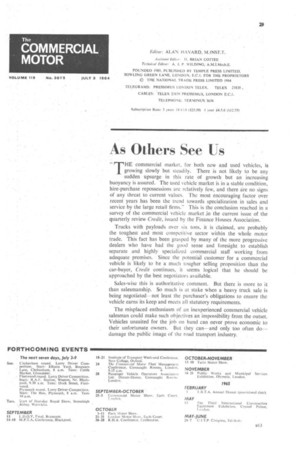As Others See Us
Page 31

If you've noticed an error in this article please click here to report it so we can fix it.
T " HE commercial market, for both new and used vehicles, is growing slowly but steadily. There is not likely to be any sudden upsurge in this rate of growth but an increasing buoyancy is assured. The used vehicle market is in a stable condition, hire-purchase repossessions are relatively few, and there are no signs of any threat to current values. The most encouraging factor over recent years has been the trend towards specialization in sales and service by the large retail firms." This is the conclusion reached in a survey of the commercial vehicle market in the current issue of the quarterly review Credit, issued by the Finance Houses Association.
Trucks with payloads over six tons, it is claimed, are probably the toughest and most competitive sector within the whole motor trade. This fact has been grasped by many of the more progressive dealers who have had the good sense and foresight to establish separate and highly specialized commercial staff working from adequate premises. Since the potential customer for a commercial vehicle is likely to be a much tougher selling proposition than the car-buyer, Credit continues, it seems logical that he should be approached by the best negotiators available.
Sales-wise this is authoritative comment. But there is more to it than salesmanship. So much is at stake when a heavy truck sale is being negotiated—not least the purchaser's obligations to ensure the vehicle earns its keep and meets all statutory requirements.
The misplaced enthusiasm of an inexperienced commercial vehicle salesman could make such objectives an impossibility from the outset. Vehicles unsuited for the job on hand can never prove economic to their unfortunate owners. But they can—and only too often do— damage the public image of the road transport industry.












































































































































